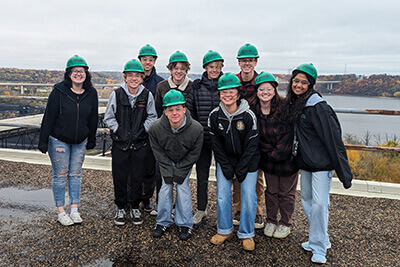December 4, 2023

Ms. Sullivan’s chemistry class recently ventured to the Allan S. King Power Plant in Marine on St. Croix. In their current unit on atmospheric chemistry, their studies delve into the intricate world of indoor and outdoor air pollution, including sulfur dioxide’s and nitric oxide’s role in acid rain formation, particulate matter, and more.
The class’s discussion naturally extended to the crucial topic of climate change, investigating its implications, and alternatives to fossil fuel usage. This field trip was a real eye-opener for students, offering a tangible connection between the discussion and theoretical knowledge gained in the classroom and its real-world application.
One main focal point of their excursion was to explore the cutting-edge technologies being used to remove sulfur dioxide, nitric oxides, and particulate matter at the King Power Plant and discover what makes it stand out among coal-burning facilities. Students had learned about these technologies in the environmental chemistry course, and even used stoichiometry calculations to determine how much calcium carbonate is needed to neutralize the sulfur dioxide that comes from burning coal in Minnesota, exemplifying the future-forward philosophy that is heavily integrated within MPA’s education.
Walking through the plant, students not only witnessed advanced environmental technologies but also engaged in conversations with the plant manager. These discussions provided insights into the career and economic implications of transitioning to renewable energy sources, reinforcing the vital link between science and society.
What made this experience even more remarkable was its origin—a chance encounter during parent-teacher conferences. Nick Martin, a parent who works for Excel Energy, noticed information about Ms. Sullivan’s atmospheric chemistry unit displayed on the board. Intrigued, he extended an invitation for MPA students to witness these concepts in action. Learning extends beyond the classroom at MPA, and the active involvement of our community members adds a unique dimension to the educational journey.
The King Power Plant, though set to discontinue coal usage by 2028, will be repurposed into a distribution hub for solar energy and other renewables. This aligns seamlessly with the class’s discussions on the evolving landscape of energy production and the imperative shift toward sustainability.
This field trip served as an invaluable opportunity for students to witness the practical applications of their academic pursuits. By experiencing firsthand the environmental technologies at play and understanding the broader societal impacts, they gained a deeper appreciation for the pivotal role science plays in addressing pressing global challenges.